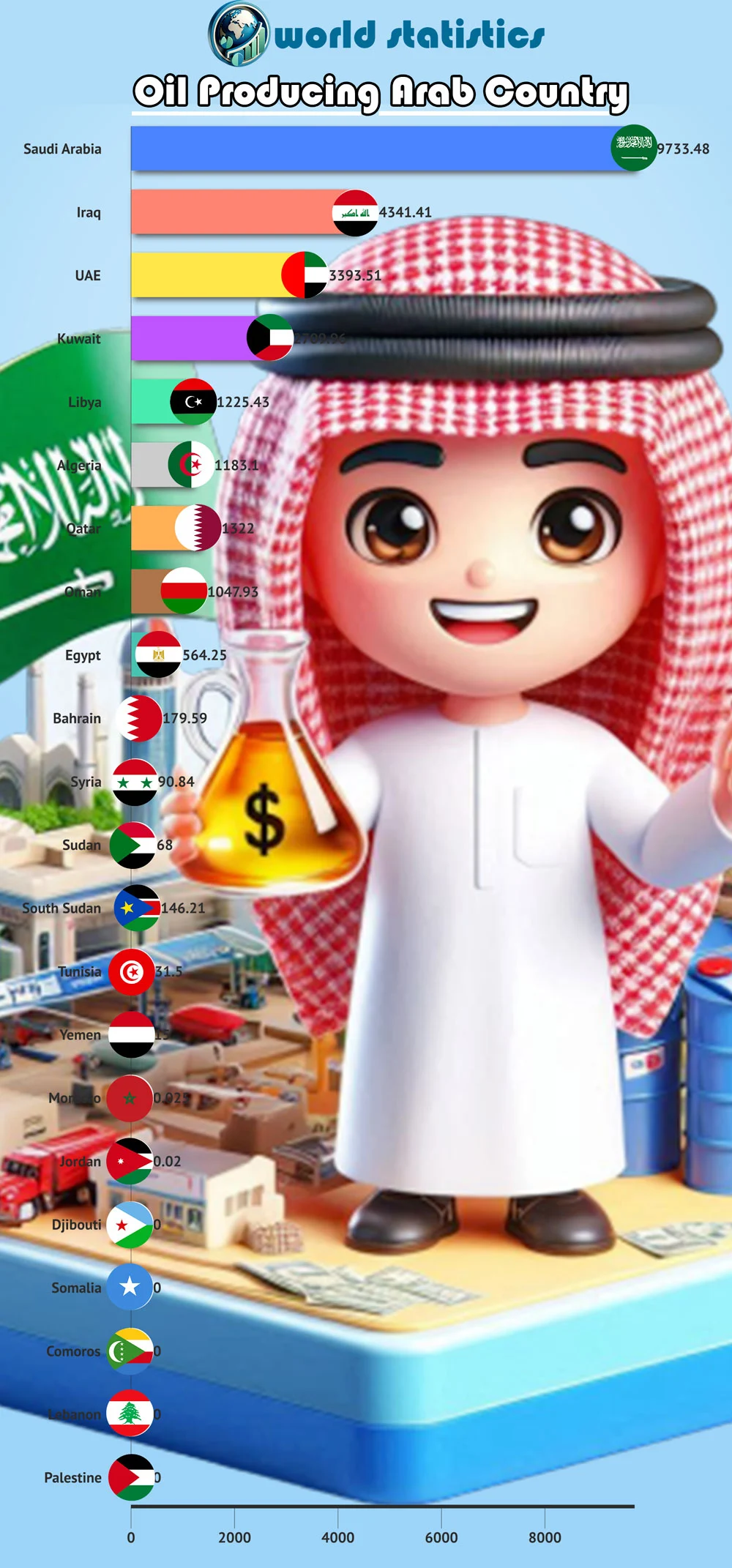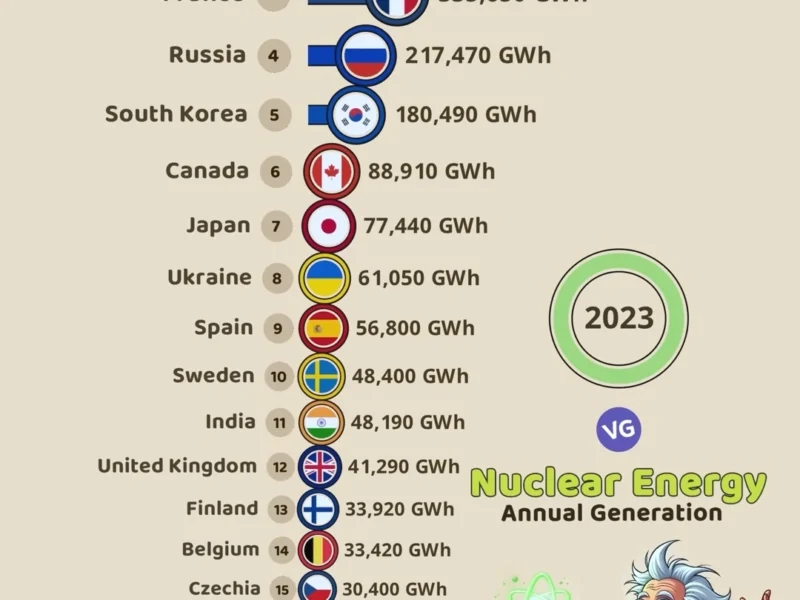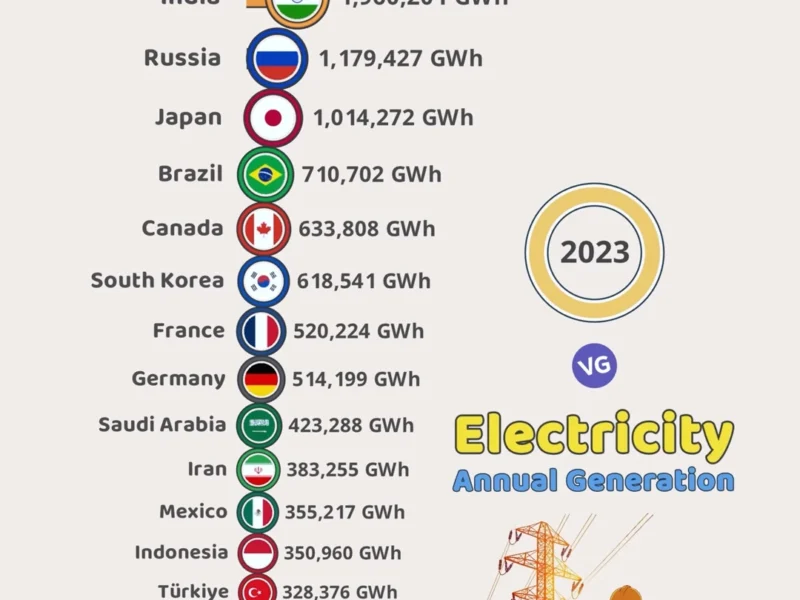The Middle East leads the world in oil production, supplying 26% of total volume. At the heart of this industry is Saudi Arabia, the top oil producer globally. It contributes 15% of the world’s oil. Each day, this nation churns out 12,402,761,040 barrels, firmly securing its oil kingdom.
| Global Rank | Country | Oil Production (Thousand Barrels per Day) | Flag |
|---|---|---|---|
| 3 | Saudi Arabia | 9733.48 | 🇸🇦 |
| 7 | Iraq | 4341.41 | 🇮🇶 |
| 8 | UAE | 3393.51 | 🇦🇪 |
| 10 | Kuwait | 2709.96 | 🇰🇼 |
| 18 | Libya | 1225.43 | 🇱🇾 |
| 19 | Algeria | 1183.10 | 🇩🇿 |
| 17 | Qatar | 1322.00 | 🇶🇦 |
| 21 | Oman | 1047.93 | 🇴🇲 |
| 29 | Egypt | 564.25 | 🇪🇬 |
| 47 | Bahrain | 179.59 | 🇧🇭 |
| 57 | Syria | 90.84 | 🇸🇾 |
| 60 | Sudan | 68.00 | 🇸🇩 |
| 50 | South Sudan | 146.21 | 🇸🇸 |
| 68 | Tunisia | 31.50 | 🇹🇳 |
| 76 | Yemen | 15.00 | 🇾🇪 |
| 111 | Morocco | 0.025 | 🇲🇦 |
| 112 | Jordan | 0.02 | 🇯🇴 |
| – | Mauritania | No data available | 🇲🇷 |
| – | Djibouti | 0 | 🇩🇯 |
| – | Somalia | 0 | 🇸🇴 |
| – | Comoros | 0 | 🇰🇲 |
| – | Lebanon | 0 | 🇱🇧 |
| – | Palestine | 0 |
Unfortunately, I am a writer who lives in Morocco. The price of gasoline is very high. I pray for the opportunity to work in the Gulf countries, haha
Key Takeaways
- The Middle East accounts for 26% of global oil production.
- Saudi Arabia is the world’s largest oil producer, responsible for 15% of global output.
- Saudi Arabia’s yearly oil production stands at 12,402,761,040 barrels per day.
- Iraq and Iran are also major oil producers in the Middle East.
- The Middle East’s oil dominance is a testament to its vast reserves and strategic importance in the global energy landscape.
Introduction to Oil Production in the Middle East
Oil Production in Arab Countries (Thousands of Barrels per Day)
Source: World Statistics
.
The Middle East is well known for its oil. It has some of the largest oil reserves in the world. Countries like Saudi Arabia, Iraq, and the United Arab Emirates (UAE) are big in oil production. They account for over a quarter of the world’s oil output.
Oil is vital for the world’s economy. It powers many aspects of our life. It affects global politics, trade, and how our economies grow.
Overview of Middle Eastern Oil Reserves
The Middle East is rich in oil. It holds more than 855 billion barrels of proven reserves. This is over 80% of the world’s total known oil.
This gives the region a lot of power in the oil industry. They are a major player in the global energy market.
| Country | Average Daily Oil Production (million barrels) |
|---|---|
| Saudi Arabia | 10.4 |
| Iraq | 4.6 |
| Iran | 3.6 |
| United Arab Emirates | 3.0 |
| Kuwait | 2.9 |
| Qatar | 0.6 |
OPEC members aren’t the only ones producing oil in the Middle East. Other countries like Oman, Bahrain, and Egypt also add to the total. Combined, they add about 1.6 million barrels a day.
Importance of Oil in the Global Economy
Oil is crucial for the world’s economy. It fuels industries and transports people and goods. Because the Middle East has so much oil, it’s a big player in the global energy scene.
The region’s oil influences international trade and the world’s economy. It has big effects on how nations work with each other.
“The Middle East’s oil reserves are the lifeblood of the global economy, providing a significant portion of the world’s energy needs and shaping international relations and trade.”
The world is changing, and we need more energy. The Middle East’s role in the oil market is key. Understanding its oil production is essential for our global economy.
Saudi Arabia: The Largest Oil Producer in the Arab World
Saudi Arabia is the world’s biggest oil producer and a key player in energy worldwide. It’s home to Saudi Aramco, the world’s top oil producer, owned by the state.
Saudi Aramco and Its Dominance
Saudi Aramco is a giant in the oil world. In 2022, it made an incredible US$535.188 billion in revenue. Its operating income was US$305.087 billion, and its net income was US$161.068 billion.
This company is big; it has 70,496 employees. In 2019, Saudi Aramco became worth more than US$2 trillion, showing its importance. It has the second-largest known reserves of oil and the biggest oil production every day.
Saudi Arabia’s Proven Oil Reserves
Saudi Arabia’s oil reserves are massive. It holds about 17 percent of the world’s proven petroleum reserves. In 2022, Saudi Aramco produced an average of 13.6 million barrels per day (mmbpd), with 11.5 mmbpd of crude oil.
This abundance of reserves and Aramco’s work make Saudi Arabia the top oil producer in the region. This solidifies its status as a world energy leader. As global energy patterns change, Saudi Arabia and its oil company stay important, leading the future oil market.
Iraq: Rising Oil Production After Conflicts
Iraq is known for its long history and lots of natural wealth. Lots of progress has been made in oil production recently. As the sixth largest oil maker in the world and the second biggest in OPEC, Iraq’s oil business is getting stronger. This is after years of trouble and fights in the country.
Challenges Faced by Iraq’s Oil Industry
Even with plenty of oil, Iraq’s oil business has not reached its full potential. Problems like political trouble, continued violence, and a weak structure are holding it back. Recent figures show that Iraq’s oil sales will be cut to 3.3 million barrels a day. This is after passing the limit set by OPEC+, with a drop of 130,000 barrels a day from February to March.
The Iraqi government makes most of its money from oil, over 90%. This makes the oil business very important for Iraq’s money situation. Although other parts of the economy might do better in 2024, the overall economic future is unclear. This shows why it’s so important to keep improving and investing in the country’s oil sector.
Major International Oil Companies in Iraq
Even with challenges, big international oil companies see Iraq’s huge oil chances. Names like ExxonMobil, Dhi Qar Oil Company, Lukoil, and Basra Oil Company are active here. They are helping Iraq produce more oil steadily.
The Kurdistan Regional Government (KRG) adds around 400,000 barrels a day to Iraq’s total. This oil-rich country has 112.5 billion barrels of proven reserves. This makes it the second biggest oil reserve area globally, after Saudi Arabia.
“Iraq’s oil sector required an estimated $50 billion investment to raise production to its estimated capacity of 2.8 million barrels per day, a process that would take at least two years.”
Iraq is working hard to deal with its oil business’ problems. The country aims to make more oil and use its energy wealth fully. Iraq is getting help from other countries and making new investments. This shows the important role Iraq’s oil sector has in the world’s energy future.
The United Arab Emirates: A Federation of Oil-Rich Emirates
The United Arab Emirates (UAE) is made up of seven Emirates. Each one has its own history and economic strengths. Abu Dhabi is the biggest and most powerful. It holds most of the UAE’s oil. The Abu Dhabi National Oil Company (ADNOC) manages oil production here, shaping the UAE’s oil policies.
Abu Dhabi’s Role in UAE Oil Production
In 1962, Abu Dhabi sent out its first shipment of crude oil. This was a turning point for the UAE. Since then, Abu Dhabi’s oil sector has grown. Sheikh Zayed bin Sultan Al Nahyan, who became its leader in 1966, worked to unite the Emirates and improve the country.
Today, the UAE is the world’s eighth-largest oil producer. It makes over 4 million barrels a day. Most of this comes from Abu Dhabi. Here, the Abu Dhabi National Oil Company (ADNOC) manages the oil work. This helps the UAE be a big player in the world’s energy markets.
| Key Oil Production Statistics in the UAE | Value |
|---|---|
| First cargo of crude oil exported from Abu Dhabi | 1962 |
| Sheikh Zayed bin Sultan Al Nahyan chosen as Ruler of Abu Dhabi | 1966 |
| Dubai started exporting oil | 1969 |
| United Arab Emirates formally established | December 2, 1971 |
| Total oil production in the UAE (barrels per day) | Over 4 million |
| UAE’s ranking as the world’s largest oil producer | 8th |
The oil industry has been key to the UAE’s growth. It has helped the UAE become a wealthy and advanced country in the region. As the UAE looks to the future, it’s working to use more renewable energy. But, Abu Dhabi’s oil is still very important to the UAE’s future.
“Abu Dhabi’s oil production has been the backbone of the UAE’s economic success, enabling the country to invest in infrastructure, education, and social welfare programs that have improved the lives of its citizens.”
Iran: Sanctions and Underperformance
Iran is the ninth-largest oil producer. It plays a big role in the world’s energy scene. However, economic sanctions have hit its oil industry hard. This has led to challenges for a country that once produced almost 4 million barrels a day.
Impact of Economic Sanctions on Iranian Oil Production
Economic sanctions deeply affected Iran’s oil and gas sectors. They saw less investment and many projects cancelled. As a result, the country has not been able to use its full capacity to produce oil. This issue is seen through different presidential terms, where output levels fluctuate.
Before the 1979 revolution, Iran was doing well. It produced 5.11 million barrels a day in the final decade of the Shah’s rule. But, this number dropped by 22% to 4.18 million barrels a day under the Islamic Republic.
The National Iranian Oil Company
The National Iranian Oil Company (NIOC) handles oil and gas matters. It works under the Supreme Energy Council. Despite the odds, NIOC is trying to keep Iran relevant in the global energy picture. They are thinking of new ways to work around the sanctions.
For instance, Iran started using a unique fleet of tankers to ship oil. This fleet includes large vessels called VLCCs. It has helped keep oil exports to China on track, even though China gets a deal on Iranian oil.
Yet, the sanctions have hit Iran’s oil income hard. It’s estimated that Iran loses about $15 million daily. This loss comes from a significant portion of their budget, China. Due to this, Iran faces a budget gap of $13.5 billion, the biggest in its history.
The future of Iran’s oil is unclear. Sanctions and the complex world situation make it hard to predict. NIOC’s ability to find new solutions will shape where Iran’s oil industry goes. This is a big challenge for the country.
The largest oil producing Arab country
Saudi Arabia is known for its big role in the oil market in the Arab world. It makes about 15% of the global oil supply, which is roughly 11 million barrels of oil each day. The country’s known oil reserves are huge, about 267 billion barrels, securing its future as a major oil producer.
The state-owned oil company, Saudi Aramco, is a key player in the oil industry. It’s the biggest in the world. Its success shows the strength of Saudi Arabia’s oil and its place in the market. In 2019, Saudi Aramco had a very successful stock market debut, showing the high value of Saudi oil.
| Country | Oil Production (million barrels per day) | Ranking |
|---|---|---|
| Saudi Arabia | 11.0 | 2nd |
| Iraq | 4.42 | 6th |
| United Arab Emirates | 4.0 | 8th |
| Iran | 3.98 | 9th |
| Kuwait | 2.95 | 10th |
Many Middle Eastern countries, including Saudi Arabia, contribute around 26% to global oil production. Saudi Arabia is at the top, thanks to its large oil fields. This makes it the leading Arab country for oil production.
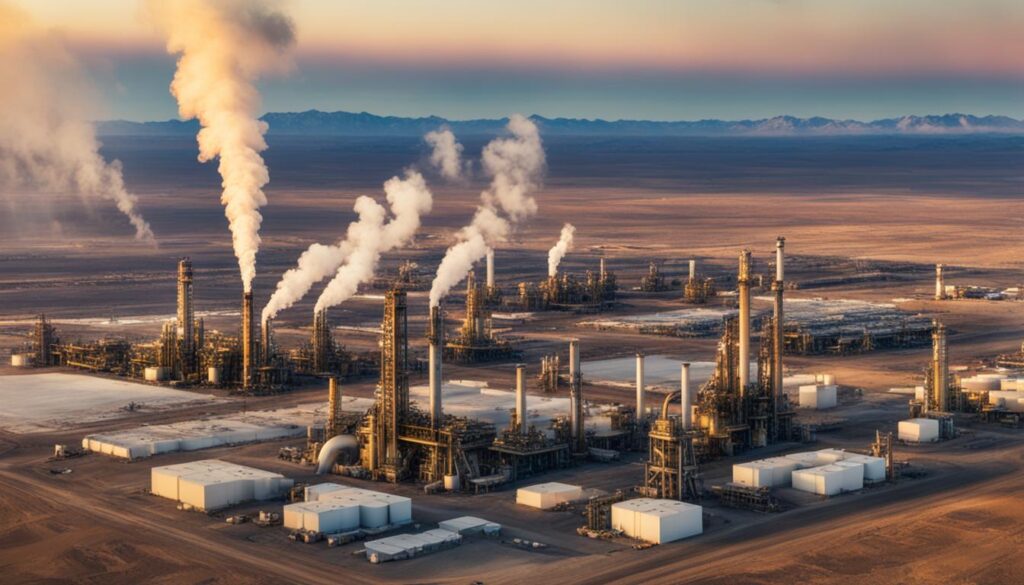
Other Arab nations, like Iraq, the UAE, and Kuwait, are also important in oil. However, Saudi Arabia is in a league of its own. It leads among Arab countries, mainly because of its production level and its role in OPEC.
Kuwait: Consistent Production Amid Challenges
Kuwait is the fourth-largest oil producer in the Middle East. It produces 2.5-3 million barrels daily. This makes it a key player in the world’s energy market. But, it’s had a hard time reaching its goal of 4 million barrels daily by 2020. This is because it needs more foreign money and new oil projects are delayed.
Kuwait’s Foreign Direct Investment Law
In 2013, Kuwait made a big change to attract more foreign money and know-how. They passed a foreign direct investment law. This law let foreigners own 100% of businesses. It was a big deal for the country’s oil and gas industry, hoping to grow strong beyond just energy.
But, the law hasn’t fully hit its mark yet. Some foreign oil companies have joined in on Kuwait’s oil projects. However, things have not moved as fast as hoped. Bureaucracy and unclear rules, plus a slow approach to letting foreigners in the energy field, are holding things back.
“Kuwait’s foreign direct investment law was a step in the right direction, but more needs to be done to streamline the investment process and provide greater clarity for potential investors.”
Even with these issues, Kuwait is determined to use its full oil production power. It also wants to mix up its economy. The country’s good spot, stable politics, and wealthy funds make it appealing for investors. They’re especially interested in energy and building stuff.
For Kuwait to move forward, the government needs to make investing easier. It should clear up rules, so people know what to expect. Also, working with foreign groups is key. This way, Kuwait can make the most of its oil resources. Then, it can have a strong, lasting economic future.
OPEC’s Role in Regulating Middle Eastern Oil Production
OPEC is mainly in the Middle East and has 13 member countries. It works to regulate opec middle east oil production by setting production limits. The goal is to keep oil prices stable and make sure there’s enough oil for everyone.
OPEC has a big say in the world’s oil market, with almost 40% of oil production in its hands. It started with five countries in 1960 but has since grown. Now it covers 13 nations. Together, these countries have nearly 80% of the world’s known oil. The Middle East alone has two-thirds of this oil.
| Key OPEC Statistics | Value |
|---|---|
| Percentage of crude oil reserves held by OPEC countries (2021) | 80.4% |
| Approximate share of the world’s oil production that comes from OPEC member countries | 40% |
| Percentage of the world’s petroleum market that is accounted for by OPEC member countries | 60% |
| Number of OPEC member countries (as of 2021) | 13 |
| Percentage of the world’s oil reserves held by OPEC and other oil-producing countries within the OPEC+ group | 90% |
OPEC’s control over opec middle east oil production changed over the years. In the 1970s, its oil embargo led to big shifts in global oil prices. After that, its power lessened as some countries didn’t follow the rules about oil production.
In spite of these difficulties, OPEC is still important for keeping oil markets steady, especially in crises. For example, during the COVID-19 pandemic, OPEC and its partners were key in preventing serious oil market problems, unlike other energy sectors.
“OPEC’s role in regulating Middle Eastern oil production has been a complex and often controversial one, with the organization wielding significant influence over global energy markets.”
Going forward, how well OPEC can manage opec oil production regulation will be crucial. It will affect the future of the oil industry and the global economy.
Environmental and Sustainability Concerns
The oil industry in the Middle East creates big environmental worries. The countries there, known for their oil, face problems like not enough water, pollution, and too many greenhouse gases. It’s very important that they start fixing these things quickly.
Efforts to Diversify Energy Sources
Middle Eastern countries are trying to use more than just oil for energy. The United Arab Emirates, for example, is investing a lot in solar power to help protect the environment. Projects like the Eco City are set up to use less fossil fuels and more solar energy.
Saudi Arabia is also moving towards cleaner energy with its Saudi Green Initiative. The goal is to have 50% of energy come from renewable sources by 2030. They want to become totally green by 2060. Some say they should be doing even more to solve environmental issues faster.
More people in the Middle East want to protect the environment now. A survey showed that 95% think their countries need to do better. And 73% are ready to help with efforts to raise awareness about the environment. This shows a big push for stronger actions and policies against environmental problems.
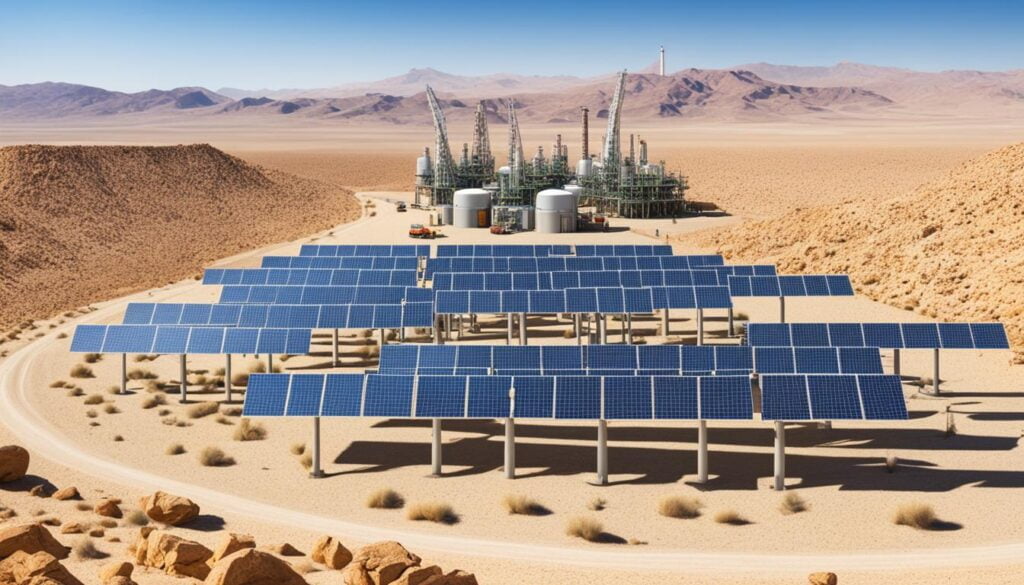
“By 2050, climate change in Saudi Arabia is projected to increase temperatures by around 4°C, risking hazardous health conditions for the population and potential large crop failures.”
The Middle East needs to change how it uses energy because of these serious environmental issues. The goal is to use less oil, make fewer bad emissions, and stop or slow down climate change and environmental harm.
| Indicator | Value |
|---|---|
| Saudi Arabia’s desert land area | Over 98% of the country’s territory |
| Land available for agriculture in Saudi Arabia | Only 1.6% |
| Saudi Arabia’s dependence on imports | Over 70% of food and industrial goods |
| Desert area in the Arabian region | 2,331,000 km2 |
| Estimated annual deaths due to air pollution in Saudi Arabia | Over 8,000 |
The Middle East must move away from oil to protect the environment. By using different energy sources and being more careful with resources, it can create a better future for the planet.
Future Outlook for Middle Eastern Oil Production
The Middle East will keep being an important part of the world’s energy market. It has huge oil reserves and costs less to produce. Yet, it is looking into new ways to produce more oil, like better recovery methods and exploring offshore areas.
Emerging Technologies and Exploration Opportunities
Countries in the Middle East are using new technologies to increase their oil production. Saudi Arabia wants to get half its electricity from renewables by 2030. The UAE aims to have 44% of its electricity come from renewables by 2050. This shows they’re serious about using different energy sources and not just oil.
They are also looking at the sea to find more oil. In 2018 and 2019, the UAE offered new areas for oil exploration in places like Abu Dhabi. This move helps them find more oil to produce.
There is hope in using technology to capture and store carbon from oil production. Right now, only a small part of global carbon emissions is caught and stored (about 43 million tons). But, they want to do more to help the environment.
Climate change is a big issue, but the Middle East is ready to play a big part in the oil market. The Gulf could see a major temperature increase by 2050. This means they need to use energy more wisely and find other sources of energy.
In the end, the Middle East’s oil future is about new technology, caring for the environment, and still using a lot of oil. The world’s energy scene is changing, and the Middle East is getting ready to change with it.
Geopolitical Factors Influencing Oil Production
The Middle East is full of oil-rich countries. They are affected by tension, conflict, and sanctions. These issues can really shake up how oil is produced and traded globally.
The Gulf states, like Saudi Arabia and Kuwait, have a lot of oil and gas. They own over 30% of the world’s oil and 20% of its gas. Saudi Arabia has the most oil, Kuwait is next, and then comes the UAE. Qatar has the top spot for gas.
This area has had a big impact on the world’s oil market in the past. For instance, they’ve influenced oil prices during the 1973 Arab oil embargo and the more recent 2020 oil price war between Saudi Arabia and Russia. Saudi Arabia, the UAE, and Kuwait are part of OPEC, a group that can sway global oil prices.
After the 9/11 attacks, oil prices quickly went up. They dropped sharply after 14 days, showing how quickly things can change. When Russia invaded Ukraine in 2022, oil prices spiked almost 30% in two weeks.
Big jumps in global geopolitical risks don’t often mean oil prices will rise. But, they can affect the economy in ways that do. Usually, these events push oil prices down. The effects start off slow but hit after about three months.
The response to these risks varies by country. And, though the initial impact can be strong, it fades away quickly. After about three months, the effect on oil prices is usually gone.
The Gulf states are looking to move to cleaner energy options. They want to cut their carbon emissions. The growing use of renewable energy and a possible lower demand for oil soon will change the game. This will influence the Middle East’s role in the global oil market.
Conclusion
The Middle East’s oil industry is a key global player, led by countries like Saudi Arabia, Iraq, and the United Arab Emirates. It faces challenges, including political instability and sanctions. However, it remains a crucial source of oil worldwide, contributing significantly to global production and reserves.
Looking ahead, the industry must balance its oil role with growing concerns for the environment and sustainability. It should embrace new tech, use a variety of energy sources, and practice sustainability. These steps are key to a secure and sustainable energy future for the region.
In conclusion, the Middle East’s oil industry is a vital part of the world’s energy picture. How it deals with future challenges and chances will influence global energy production and use. It has the opportunity to stay on top in oil production and tackle environmental issues at the same time.
FAQ
What is the role of the Middle East in global oil production?
The Middle East is key in world oil production. It owns five top spots in production. Around 26% of the world’s oil is produced there.
Which country is the world’s largest oil producer?
Saudi Arabia leads the world in oil production. It makes up about 15% of the global production.
What is the current oil production status of Iraq?
After the Iraq War, Iraq’s oil production grew. It is now second-largest in the Middle East for production.
How has Iran’s oil production been affected by economic sanctions?
Iran is a big oil producer in the world. However, it doesn’t produce as much because of economic sanctions.
What is the current oil production status of Kuwait?
Kuwait ranks ninth in world oil production. It has been producing between 2.5 million and 3 million barrels a day for over ten years.
What is the role of OPEC in regulating Middle Eastern oil production?
OPEC manages oil from 13 countries, many in the Middle East. It controls the production and prices of oil.
What are the environmental concerns related to the Middle East’s reliance on oil production?
The Middle East’s focus on oil is hurting the environment. Countries there are starting to use more renewable energy. They also aim to cut their carbon levels.
What is the future outlook for Middle Eastern oil production?
The Middle East will keep being a big part of the global oil scene. It has a lot of oil and low costs for production.
How do geopolitical factors influence oil production in the Middle East?
Political issues and tensions can affect the oil industry in the Middle East. This includes production, investment, and trading of oil.

